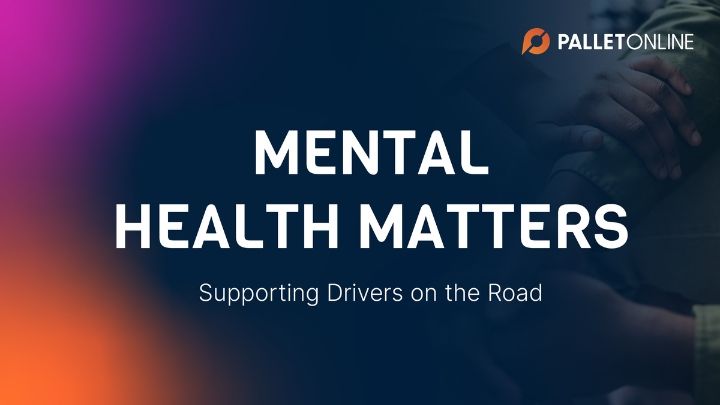Mental Health Matters: Supporting Drivers on the Road
Driver mental health is a growing epidemic within the transport and logistics industry, and it’s clear that it must be addressed.

As drivers continue to suffer from the effects of soaring costs, low pay and long hours, the resulting stress and burnout can cause serious mental health issues. The consequences of ignoring these issues can wreak havoc on employees, logistics firms and even the general public, as we see poor mental health becoming a common cause of accidents on the road.
In this blog, we’ll explore the current issues HGV drivers face, the responsibilities an employer has to provide help and support, and what drivers themselves can do to improve mental wellbeing.
The Cost of Living
It’s no secret that cost pressures in all industries are still on the up, but for those working in the transport sector, the burden of long hours, tight schedules and low pay is starting to take an enormous toll on HGV drivers and other logistics workers.
The poor work-life balance experienced by many has, and will, lead to burnout, sky-high stress levels and, ultimately, serious mental health issues such as anxiety or depression.

Sadly, it looks like these issues are already having an impact on many haulage firms. Research from Mind showed that 30% of self-reported illness in the transport and logistics sector is a result of stress, depression and anxiety.
Although companies have become better at providing help for workers in recent days, the lack of proper mental health resources in the workplace is still evident. In fact, a whopping 71% of UK employers admit that they don’t have sufficient resources in place to support their workers.
Fortunately, though, it’s not all doom and gloom! Recently, we’ve seen businesses within the industry step up and tackle the driver mental health crisis, and rightly so.
For example, the team at Lymm Truckwash managed to raise almost £1000 for mental health charities to help those suffering from isolation and loneliness behind the wheel, while Hopeful Families have shared a touching story about how they helped a struggling HGV driver when he lost his licence.
Initiatives like this are, of course, a refreshing sight within the industry, and it’s great to see organisations give an extra helping hand when times are tough.
A Supportive Role
In the current climate, it’s never been more important for employers up and down the country to recognise the mental health issues their employees may face, and provide appropriate support where needed. Employers can help their staff in a number of ways, including 1-to-1 meetings, catch-ups, organising counselling sessions and even providing employee wellbeing programmes.
Did you know: employers have a legal responsibility to help their employees with any mental health issues?
Unfortunately, the topic of mental health is still enveloped in stigma and taboo by many people, but this should never be the case. Nobody should be scrutinised for speaking up about their mental state, and it’s even more important that every employer creates a supportive and understanding environment for all.

It’s also essential to provide staff with a good work-life balance, as long hours and dull days can contribute to increased stress levels and burnout.
To provide support on the go, many businesses are utilising resources such as mental health apps, which can provide staff with advice about how to get through tough times, and even allow them to talk to a trained professional!
These apps and programmes are key to tackling the current mental health stigma, as it encourages anyone to speak up if they’re struggling.
Self-Care is Key
Aside from the help of employers, self-care is also a great way to improve mental wellbeing. We’ve created a list of three excellent self-care tips:
Get regular exercise - 30 minutes of walking each day can increase mood and help with mental and physical health
Sleep well - we understand that many logistics workers work long hours, but adequate sleep is an essential part of self-care, and prioritising this is vital
Try meditation - taking some time to meditate and clear your head is a proven way to reduce stress, burnout and anxiety
One of the most important self-care tips is to take time for yourself. Get into the habit of noticing when you need a break, and don’t be afraid to ask for time off. Remember, your employer has a duty to help.
A Direct Connection
The issue with driver mental health extends further than just personal matters, though. Research suggests that there is a direct connection between driver wellbeing and driving standards.
Drivers who are stressed and burned out are way more likely to suffer from daily fatigue, concentration issues and a lack of patience, which can lead to road rage. As a result, it’s clear that poor driver mental health can be extremely dangerous, and even deadly.

Due to these reasons, the importance of recognising mental health within the logistics industry cannot be overstated. It is vital that employers regularly check in with their staff to ensure they have a healthy work-life balance, otherwise, the consequences could be deadly, especially for HGV drivers.
A Superb Solution
Given the importance of mental health in logistics, many companies are creating innovative solutions to support drivers as and when they need it. As mentioned before, the likes of Headspace, My Possible Self and Unmind have created solutions to help battle issues with mental health, concentration and sleep.
These apps are packed with many useful features, one of them being a daily checkup, which asks employees how they’re feeling each day, and the data is collected and reported back to whoever is in charge of welfare. This can be a great way to gauge the overall mood of your employees.
Trade unions are also doing their bit to tackle poor mental health in the workplace. If you’re feeling unheard a work, a union is typically the place to go, but they can also provide assistance if you’re struggling with the likes of depression or anxiety, and give appropriate advice or solutions on how to ease these symptoms.
Overview
It’s clear that these issues are having a detrimental impact on HGV drivers and logistics workers, as the cost of living crisis, long hours and low pay see many workers suffering from poor mental wellbeing. With over a quarter of sickness-related absences being due to mental health struggles, employers are also suffering the consequences.
We advocate for prioritising employee mental health, as it’s not only essential in creating a happy and healthy workforce, but for keeping the general public safe on our roads.
If you need help with any issues mentioned in this blog, there are many resources available.